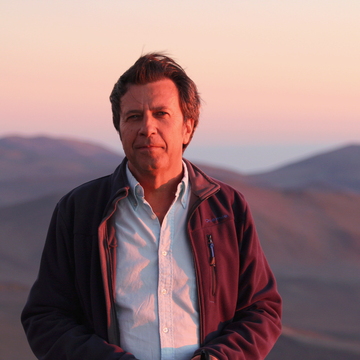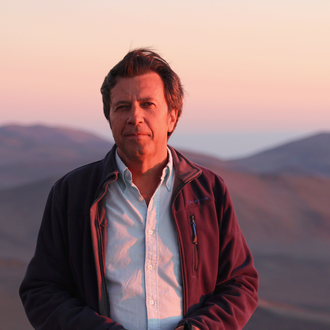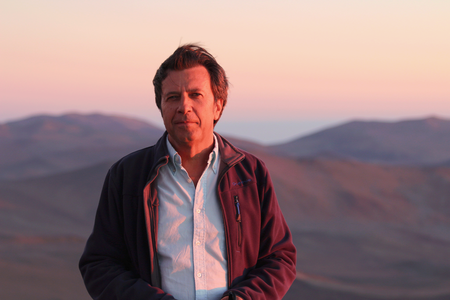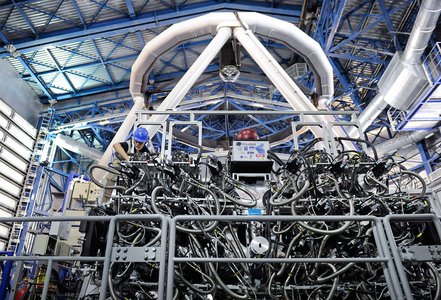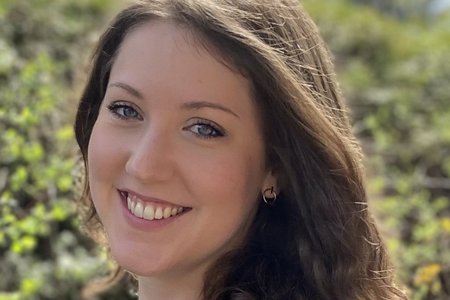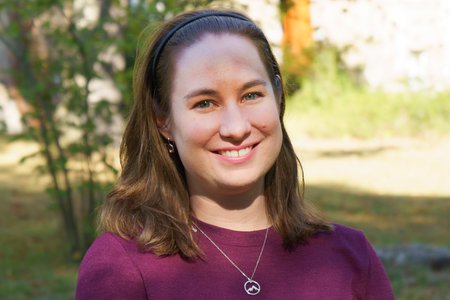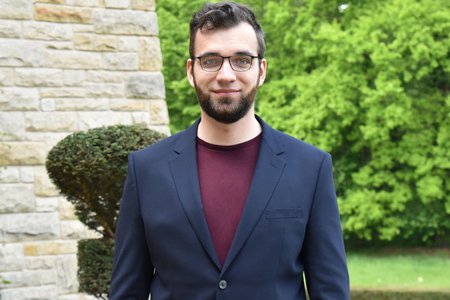Johann Wempe Award for Roland Bacon
The Johann Wempe Foundation honours Dr Roland Bacon of the Centre de Recherche Astrophysique de Lyon, France, with the Johann Wempe Award 2022 for his contributions and initiatives to innovative astronomical instruments over a period of almost 35 years, in particular for his leading role in the development of the concept of integral field spectroscopy. The award ceremony will take place at the Leibniz Institute for Astrophysics Potsdam (AIP) in Babelsberg in the Schwarzschildhaus on Tuesday, 14 June 2022, starting at 2 pm.
Roland Bacon is the Principal Investigator of the successful MUSE (Multi Unit Spectroscopic Explorer) instrument at the ESO Very Large Telescope (VLT), which was co-developed at AIP. MUSE is the most demanded instrument at the VLT today and has already led to a huge number of spectacular scientific discoveries, covering nearly all topics from solar system science to observational cosmology.
Since the 1980s, Roland Bacon has constructed and commissioned several groundbreaking instruments in the field of integral field spectroscopy, such as the TIGER instrument for the Canada-France Hawaii Telescope, which was the first IFU worldwide, the OASIS instrument – the very first Integral Field Unit (IFU) coupled to Adaptive Optics, and the SAURON instrument at the William Herschel Telescope, a widefield IFU optimized for the analysis of stellar motions and stellar populations of nearby galaxies. With IFUs, large-scale objects such as nebulae, galaxies or clusters of stars and galaxies can be studied with a single image containing spectra for each pixel.
From 1995 to 2005, Roland Bacon was director of the Centre de Recherche Astrophysique de Lyon. His research focusing on instrumentation for large optical telescopes and extragalactic astronomy allowed him to lead and participate in more than 350 publications. Roland Bacon has already received several accolades for his work, such as an ERC Advanced Grant in 2013 and the Jackson-Gwilt Medal by the Royal Astronomical Society in 2020.
Schedule of the award ceremony
From 2:00 pm
- Opening by Prof. Dr. Matthias Steinmetz, Scientific Chairman of AIP; Board of the Johann Wempe Foundation
- Welcome by Dr. Inge Schlotzhauer, Ministry for Science, Research and Culture of the State of Brandenburg; Chair of the Board of Trustees of AIP; Board of the Johann Wempe Foundation
- Laudation by Prof. Dr. Lutz Wisotzki, section head of Galaxies and Quasars at AIP
- Award ceremony
- Reception
- Ceremonial lecture by Prof. Dr. Eric Emsellem “Early-type galaxies: climbing to the top of the mass ladder”, ESO (Garching)/CRAL (Lyon)
Lectures held by Roland Bacon
"Past, present and future of integral field spectroscopy"
16 June 2022 2:30 pm: Wempe Lecture I – “Birth of the concept and first generation: TIGER, OASIS and SAURON”
22 June 2022 2:30 pm: Wempe Lecture II – “The second generation and future prospects: MUSE, BlueMUSE and the Wide Field Spectroscopic Telescope”
29 June 2022 2:30 pm: Wempe Lecture III – “Example of scientific impact: MUSE spectroscopic deep fields”
About the Johann Wempe Award
In honour of Prof. Dr. Johann Wempe (1906 – 1980), the last director of the former Astrophysical Observatory of Potsdam, the Johann Wempe Award, first awarded in 2000, is granted to an outstanding scientist. The award is financed from funds left in the will of Johann Wempe.
Former recipients are Elisabeth Newton, Alice Quillen, Oliver Gressel, Brent Tully, Thomas R. Ayres, Yehuda Hoffman, Matthias Rempel, Kenneth C. Freeman, Ignasi Ribas, Eva Grebel, Alexander Kosovichev, Isabelle Baraffe und Gilles Chabrier, Russell Cannon and Tom Abel.
The Johann Wempe Foundation honours Dr Roland Bacon of the Centre de Recherche Astrophysique de Lyon, France, with the Johann Wempe Award 2022 for his contributions and initiatives to innovative astronomical instruments over a period of almost 35 years, in particular for his leading role in the development of the concept of integral field spectroscopy. The award ceremony will take place at the Leibniz Institute for Astrophysics Potsdam (AIP) in Babelsberg in the Schwarzschildhaus on Tuesday, 14 June 2022, starting at 2 pm.
Roland Bacon is the Principal Investigator of the successful MUSE (Multi Unit Spectroscopic Explorer) instrument at the ESO Very Large Telescope (VLT), which was co-developed at AIP. MUSE is the most demanded instrument at the VLT today and has already led to a huge number of spectacular scientific discoveries, covering nearly all topics from solar system science to observational cosmology.
Since the 1980s, Roland Bacon has constructed and commissioned several groundbreaking instruments in the field of integral field spectroscopy, such as the TIGER instrument for the Canada-France Hawaii Telescope, which was the first IFU worldwide, the OASIS instrument – the very first Integral Field Unit (IFU) coupled to Adaptive Optics, and the SAURON instrument at the William Herschel Telescope, a widefield IFU optimized for the analysis of stellar motions and stellar populations of nearby galaxies. With IFUs, large-scale objects such as nebulae, galaxies or clusters of stars and galaxies can be studied with a single image containing spectra for each pixel.
From 1995 to 2005, Roland Bacon was director of the Centre de Recherche Astrophysique de Lyon. His research focusing on instrumentation for large optical telescopes and extragalactic astronomy allowed him to lead and participate in more than 350 publications. Roland Bacon has already received several accolades for his work, such as an ERC Advanced Grant in 2013 and the Jackson-Gwilt Medal by the Royal Astronomical Society in 2020.
Schedule of the award ceremony
From 2:00 pm
- Opening by Prof. Dr. Matthias Steinmetz, Scientific Chairman of AIP; Board of the Johann Wempe Foundation
- Welcome by Dr. Inge Schlotzhauer, Ministry for Science, Research and Culture of the State of Brandenburg; Chair of the Board of Trustees of AIP; Board of the Johann Wempe Foundation
- Laudation by Prof. Dr. Lutz Wisotzki, section head of Galaxies and Quasars at AIP
- Award ceremony
- Reception
- Ceremonial lecture by Prof. Dr. Eric Emsellem “Early-type galaxies: climbing to the top of the mass ladder”, ESO (Garching)/CRAL (Lyon)
Lectures held by Roland Bacon
"Past, present and future of integral field spectroscopy"
16 June 2022 2:30 pm: Wempe Lecture I – “Birth of the concept and first generation: TIGER, OASIS and SAURON”
22 June 2022 2:30 pm: Wempe Lecture II – “The second generation and future prospects: MUSE, BlueMUSE and the Wide Field Spectroscopic Telescope”
29 June 2022 2:30 pm: Wempe Lecture III – “Example of scientific impact: MUSE spectroscopic deep fields”
About the Johann Wempe Award
In honour of Prof. Dr. Johann Wempe (1906 – 1980), the last director of the former Astrophysical Observatory of Potsdam, the Johann Wempe Award, first awarded in 2000, is granted to an outstanding scientist. The award is financed from funds left in the will of Johann Wempe.
Former recipients are Elisabeth Newton, Alice Quillen, Oliver Gressel, Brent Tully, Thomas R. Ayres, Yehuda Hoffman, Matthias Rempel, Kenneth C. Freeman, Ignasi Ribas, Eva Grebel, Alexander Kosovichev, Isabelle Baraffe und Gilles Chabrier, Russell Cannon and Tom Abel.
Images
Dr Roland Bacon
Big screen size [1000 x 666, 910 KB]
Original size [5184 x 3456, 6.0 MB]
The instrument MUSE at the Very Large Telescope at Paranal Observatory in Chile.
Big screen size [1000 x 678, 240 KB]
Original size [1280 x 869, 360 KB]
